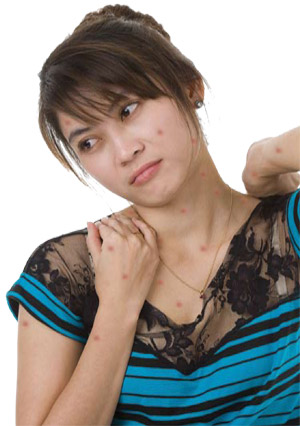Do you think that chickenpox is a harmless childhood disease that occurs only once in a lifetime? Although this viral disease most frequently affects children between the ages of 6 and 10 years, as an adult, you can also contract this disease, especially if you have never had it in the past, or in some cases, when it comes back again a second time.
Chickenpox in adulthood
Many of us get chickenpox during childhood, and our body develops a life-long immunity against the virus after that, which makes it rare for chickenpox to strike twice.
Chickenpox tends to be more serious when it occurs in adulthood. There are more blisters, and the resulting scars can be more severe. Though rare, adult chickenpox can be complicated by serious conditions, such as pneumonia, and can even be fatal. In fact, compared to children aged 1-4 years, adults have a 25 times greater risk of dying from chickenpox. About 21% of Malaysian adults aged 21-40 years have never been exposed to chickenpox and are susceptible.
The varicella-zoster virus (VZV) strikes again!
Chickenpox is caused by the varicella-zoster virus (VZV). Although the body develops immunity towards VZV after the first encounter, it doesn’t mean that the virus is eliminated from your body. The virus remains dormant (inactive), in the nerve cells near the spinal cord, long after you have recovered from the disease during your childhood.
VZV can become active again many years later in adulthood. When the virus re-emerges, usually triggered by stress or a weakened immune system, it travels along the nerves to the surface of the skin. This time, it causes the development of a painful skin rash, known as shingles (also known as herpes zoster). There can also be lingering painful post-herpetic neuralgia after disappearance of rash.
How dangerous is shingles?
Shingles usually appears only on one area of the body. Although it is generally not dangerous, it is more painful than normal chickenpox. The disease may only last 2-3 weeks, but it often causes nerve pain that lingers on for months after the rash is gone. Unlike chickenpox, shingles is less infectious as it is not airborne, and you won’t catch the virus if a person with shingles breathes or coughs near you.
VZV infections can still be transmitted to vulnerable individuals (ie not exposed to chickenpox, not been vaccinated) through contact with the blisters of an infected person, and cause chickenpox. On the other hand, you won’t get shingles from someone with chickenpox.
Those who are more likely to get shingles are usually above 50 years old, as the risk of getting shingles increases with age. People with certain medical conditions that impair the immune system (eg cancer, HIV) or take medications that suppress the immune system (like prolonged steroids or chemotherapy) are also at greater risk for shingles.
Chickenpox during pregnancy
For women who have not had chickenpox in the past, contracting chickenpox during pregnancy amplifies the risk for health complications. If pregnant women acquire chickenpox 5 days before to 2 days after delivery, the babies are likely to develop severe neonatal chickenpox which is potentially life-threatening. Getting chickenpox between 20 and 28 weeks of the pregnancy may cause a subclinical infection in the fetus resulting in early onset shingles.
Congenital chickenpox may occur during the early pregnancy stages (the first trimester to early second), which may cause the baby to be born with birth defects, known as “congenital varicella syndrome”, including low birth weight, as well as abnormalities of the limbs, skin and nervous system. If maternal chickenpox is acquired during the later part of pregnancy, the infant is likely to develop neonatal chickenpox. Neonatal chickenpox acquired during this period is usually mild and runs an uncomplicated course, as adequate antibodies from the mother’s body are transferred to the foetus, and therefore the risk for complications in the foetus is lower.
Prevent the spread
Regardless of the form of the disease, chickenpox or shingles, the diseasecausing virus is very infectious, and can be passed on from adults to children, or vice versa. As long as your body doesn’t have the defence built against the virus, you are at risk.
The best way to prevent chickenpox is through vaccination with the varicella vaccine. A vaccinated child will be protected from catching the disease from the people around him, sparing him unnecessary discomfort and suffering. Chickenpox vaccination in adults helps by lessening the severity of the symptoms and risks of complications, as well as reducing the risks of passing the disease to unprotected children and adults. Two doses of the vaccine is given at least 4 weeks apart.
In Malaysia, a combination vaccine containing varicella vaccine, together with the mandatory measles-mumpsrubella (MMR) vaccines for childhood immunisation, is currently available. While chickenpox vaccination is optional (not mandatory), the fourcomponent combination vaccine is able to provide children protection against four illnesses, all conveniently and safely in one shot.
Stop the spread, get vaccinated today; talk to your doctor for more information on chickenpox and the varicella vaccine.



Komen